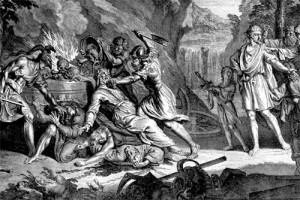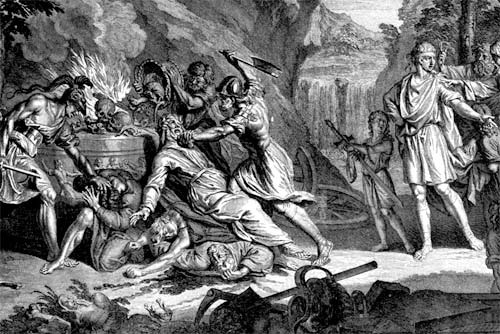 Here’s a few salient quotes from last week’s study of Zephaniah 1:2-13:
Here’s a few salient quotes from last week’s study of Zephaniah 1:2-13:
On verse 4: Zephaniah 1:4 “So I will stretch out My hand against Judah And against all the inhabitants of Jerusalem. And I will cut off the remnant of Baal from this place, And the names of the idolatrous priests along with the priests.
Baal was the god of productivity: his function in Canaanite religion was to make land, animals, and humans fertile. Baal was another name for the gross national product, and wherever people see bank balances, prosperity, a sound economy, productivity, and mounting exports as the essence of their security, Baal is still worshiped. Baal was also the god of religious excitement and sexual free-for-all. Human sexual acts were publicly offered to h im to prompt him to perform his work of fertilization. No wonder his officiants were called the “frenzied ones.” Wherever excitement in religion becomes an end in itself and wherever the cult of “what helps” replaces joy in “what”™s true,” Baal is worshiped.
On verse 12: Zephaniah 1:12 “It will come about at that time That I will search Jerusalem with lamps, And I will punish the men Who are stagnant in spirit, Who say in their hearts, “˜The Lord will not do good or evil!”™
This is not atheism as a dogma but practical atheism; it does not say, “God is not there,” but, “God is not here” ““ not that God does not exist but that he does not matter.
In relation to this philosophy of life, the prophet reveals both the mind of God and the mind of humans: the Lord (1:12a-c) is determined to root out every vestige of evil, searching it out with lamps. But behind the errant lifestyle is a theology (1:12e-f) that the Lord is there (in heaven) but not here (in daily life), that the Lord is alive but not active. If it is permissible to understand “good” and “harm” as more than a conventional expression like “good, bad, or indifferent,” then their attitude was that there is no reason toe expect his help (“the Lord will not do good”) nor to fear his disapproval (“nor will he do harm”). This is, as Craigie puts it, “the comfortable conviction that God is otiose.”
J. Alec Motyer,”Zephaniah,” The Minor Prophets: An Exegetical & Expository Commentary, Thomas Edward MComiskey, ed., 912, 921.
You can hear what I did with this passage last week HERE.







